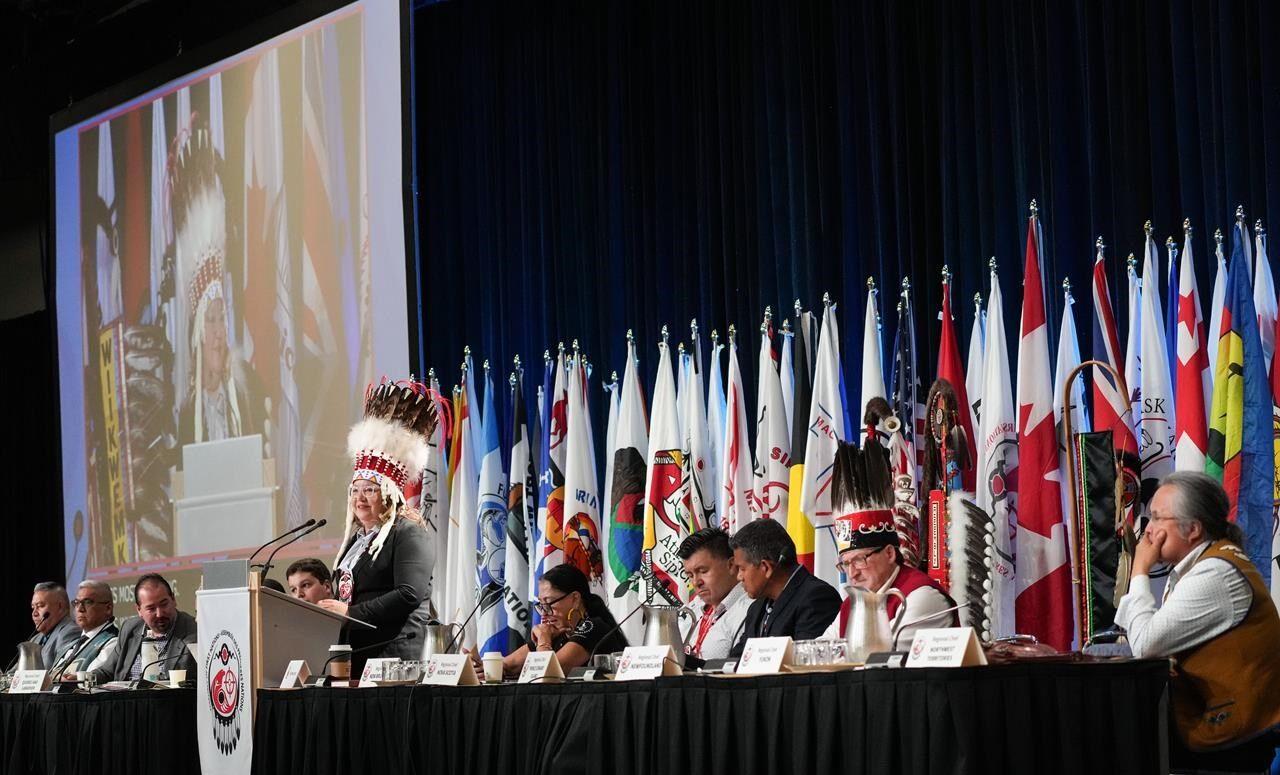AFN vote on $47.8B child welfare reform deal doesn’t pass after lengthy debate
At a special chiefs meeting in Calgary hosted by the Assembly of First Nations, 267 out of 414 chiefs voted against a resolution in support of the deal.

First Nations chiefs have voted to reject a historic $47.8-billion child welfare reform agreement reached with the Canadian government in July.
During a special chiefs assembly in Calgary hosted by the Assembly of First Nations, 267 out of 414 chiefs voted against a resolution supporting the deal after an extensive and emotionally charged debate.
Resolutions remain on the agenda for the gathering's final day on Friday, including a proposal for chiefs to have an additional 90 days to review the deal, which would lead to another vote in January.
“Our leaders have rejected this draft agreement because they understand what’s at stake: our children,” said Mary Teegee, chair of the Our Children Our Way Society, in a statement. “This was not a good agreement; we must do better for our children.”
The agreement was reached between Canada, the Chiefs of Ontario, Nishnawbe Aski Nation, and the Assembly of First Nations following nearly two decades of legal battles over the federal government’s underfunding of child welfare services on reserves, which the Canadian Human Rights Tribunal deemed discriminatory. The tribunal mandated Canada to reach an agreement with First Nations to reform the system and to compensate children who were removed from their families and placed in foster care.
For months, chiefs and service providers criticized the deal, arguing it did not go far enough to eliminate discrimination and condemned the federal government for its alleged failure to consult with First Nations during negotiations.
In a statement released Thursday night, Nishnawbe Aski Nation expressed disappointment at the chiefs' rejection of the deal. “Leaders from across Ontario voiced their support and did their best for our children and families today, and we want to highlight the shameful way that the defeat of today’s resolution was celebrated by those in the room—many of whom are from child welfare agencies that will continue to benefit from the status quo,” the statement said.
“Our leadership has given us a strong mandate to reject the status quo and assert their authority to control the care and well-being of their children ... We will regroup, strategize, and begin discussions with the appropriate federal and provincial officials on a new path forward.”
Cindy Blackstock, executive director of the First Nations Child and Family Caring Society, which helped initiate the original human rights complaint, stated before the vote that chiefs can secure a better deal than the one proposed and that she could not endorse it.
“I want to see a day when we stop the discrimination and it doesn’t happen again — and we can achieve that,” Blackstock said. “Not in a long time; we have all the tools needed to get there.”
The national chief of the Assembly of First Nations emphasized on Wednesday and Thursday that the situation could change with a new government, while Blackstock highlighted that the reforms are mandated by a legal order, not political will. “I’ve lived through the Harper years, and the Canadian Human Rights Tribunal survived through the Harper years,” she said, referring to former Conservative prime minister Stephen Harper. “Everything is on the table.”
In another address, Blackstock criticized the federal government for failing in its duty to consult with First Nations during negotiations and after the deal was made public. “Where is Canada?” she asked.
In a statement on Wednesday, a spokesperson for the minister of Indigenous services noted that the department wouldn’t dictate how First Nations organizations engage their members.
The Assembly of First Nations is not a rights-holding organization; instead, it serves as a forum where 630 rights-holding chiefs across Canada can advocate for their concerns. The federal government is obligated to consult with First Nations when its actions could impact their rights.
Carolyn Buffalo, a mother from the Montana First Nation in Maskwacis, Alberta, was one of the representative plaintiffs in the class action for Jordan’s Principle families. Jordan’s Principle is a legal rule named after Jordan River Anderson, a First Nations child born in 1999 with multiple health issues who remained in the hospital until his death at age five due to disputes over who should fund his home-based care.
Buffalo’s son, Noah, has cerebral palsy and requires continuous care, but Ottawa has made it challenging for him to access that care on reserve. Speaking through tears at the assembly earlier Thursday, Buffalo expressed concern that chiefs would reject the deal she and others had worked on for years, stating that children would be left unprotected if the agreement was not accepted.
“I didn’t even want to come to this assembly because I knew it was going to be politically challenging,” she said. “Do I trust the AFN? No. Do I trust the Liberal government? No, but I support this legal process. That’s why we agreed to join and be part of it. If I thought for one second that this was going to harm our people, I wouldn’t be part of this… Go ahead, scuttle the agreement. But if the deal is lost, just remember what I said.”
Another representative plaintiff, Ashley Bach, who was removed from her community as a child, urged chiefs to remember that many children in care were observing the assembly, even though the discussions were traumatic for them and some exchanges were hostile. “This is a once-in-a-childhood agreement, because if we take too long, we’re going to lose another generation,” she said. “If we wait years for a perfect agreement, they won’t be kids anymore. They’ll be like me.”





